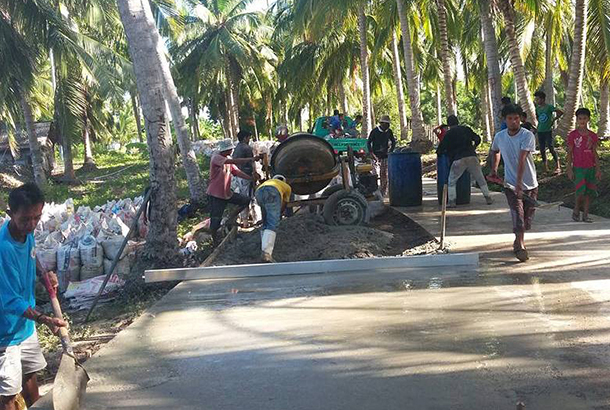
Ongoing concreting works at a portion of the Pilas-Muthamad Road in Basilan. John Unson
The massive socioeconomic interventions meant to address underdevelopment in southern island provinces is pushing the Abu Sayyaf out, security officials said.
Lt. Gen. Carlito Galvez, Jr., commander of the Western Mindanao Command, on Sunday said in Basilan, for instance, isolated areas where the Abu Sayyaf once ruled with impunity became peaceful after the completion of arterial networks that gave government health, social welfare and public works personnel access to villages to serve marginalized folk.
“There are now newly constructed roads crisscrossing the Abu Sayyaf lairs that were too difficult to reach before,” said Galvez, who was a brigade commander in the province while still a colonel.
Galvez said villagers who have fled from isolated barangays in the island province due to the activities of the Abu Sayyaf have returned after the regional government of the Autonomous Region in Muslim Mindanao (ARMM) had built schools, barangay halls, new roads and other vital infrastructures in the abandoned agricultural and fishing enclaves.
Galvez said the isolated hinterlands in Basilan where the Abu Sayyaf once operated well-fortified camps are now connected to town centers by concrete roads.
“Most remote barangays in Basilan are now within easy reach of our personnel in the municipal police offices,” seconded Chief Supt. Reuben Theodore Sindac, who is ARMM's regional police director.
It was in Basilan where the Abu Sayyaf first emerged in 1991, founded by Abdurajak Janjalani, who had worked in the Middle East years before.
While an overseas contract worker, he mingled with Arab extremists whose activities inspired him to organize the Abu Sayyaf.
Janjalani was of mixed Tausug-Ilonggo descent. His family even had a small bakery in Barangay Tabuk in Isabela City, the former capital of Basilan.
He was killed in an encounter with policemen in 1996 at a seaside village near Isabela City, the former capital of Basilan.
Reports obtained by The STAR from the municipal peace and order councils in Basilan indicated recent successes in the peaceful settlement of deadly feuds among local clans.
Reconciled leaders of rival families have agreed to work together in protecting ongoing projects in their domains from getting sabotaged by the Abu Sayyaf, according to Senior Superintendent Nickson Muksan, director of the Basilan provincial police.
Sindac said there has been a considerable decline in crimes in most municipalities in Basilan as a consequence of the improving mobility of policemen and military personnel in the island province.
Pablan Alih, a Basilan-based senior staff of the Department of the Interior and Local Government-ARMM, said the outreach missions of health and social welfare personnel of the regional government have also increased in frequency in the past three years.
“They can now get through far places that did not have roads before. The presence of government is now felt in areas whose residents the lawless groups had once controlled at gunpoint,” Alih said.
Alih, a Yakan, said credit has to go to the local executives, the Basilan provincial government, the office of Basilan District Engr. Soler Undug, the regional Public Works department and the Office of the Regional Governor, which is touted as the “Little Malacañang” of ARMM.
The infrastructure projects the ARMM government implemented in Basilan in the past four years were joint development ventures of Undug, the region’s chief executive, Gov. Mujiv Hataman and his public works secretary, Engr. Don Loong.
Galvez said what helped weaken the Abu Sayyaf in Basilan besides the ARMM infrastructure projects is the presence of local executives in their municipalities to personally oversee the pacification efforts of their respective LGUs.
“The military and the police cannot do the work alone. The local officials there and the ARMM government are actively experimenting on joint interventions to lure Abu Sayyaf members to return to the fold of law and their experiments are bearing fruits,” Galvez said.
In the past 24 months, more than 50 Abu Sayyaf gunmen in Basilan, mostly ethnic Yakans, pledged allegiance to the Philippine flag through the efforts of the mayors, the Basilan provincial government and the ARMM regional peace and order council.
“They must have realized the wrongness of their activities and the perils of living a dangerous life in places where infrastructures are now in place, generating livelihood opportunities they can avail of to have normal lives,” Galvez said.
He said the maneuverability of Coast Guard and Navy watercraft operating along the coasts of Basilan is also a lot easier now with the construction by the Hataman administration of small seaports on strategic sites around the province using ARMM’s yearly infrastructure budget.
Galvez said Basilan also has a new “roll on, roll off” docking facility in Lamitan City for larger commercial and military vessels.
The vice mayor of the seaside Lamitan City, Roderick Furigay, said the P150 million port was launched early this year by local officials led by Hataman.
“Shipping companies had sent us feelers signifying their interest to cater to the shipping needs of the city and nearby towns. This is a very positive development,” he said.
Galvez said Abu Sayyaf forces in Sulu have also been on the run for many months now due to the easier movement of tanks and combat vehicles on newly built ARMM-funded roads and seaports.
A group of Abu Sayyaf bandits in Tawi-Tawi, also an ARMM component province, surrendered to authorities early this last week.
Regional police officials attribute the surrender of Abu Sayyaf gunmen in Tawi-Tawi to the efficiency of provincial executives and the ARMM government in addressing domestic socio-economic concerns.

No comments:
Post a Comment
Note: Only a member of this blog may post a comment.